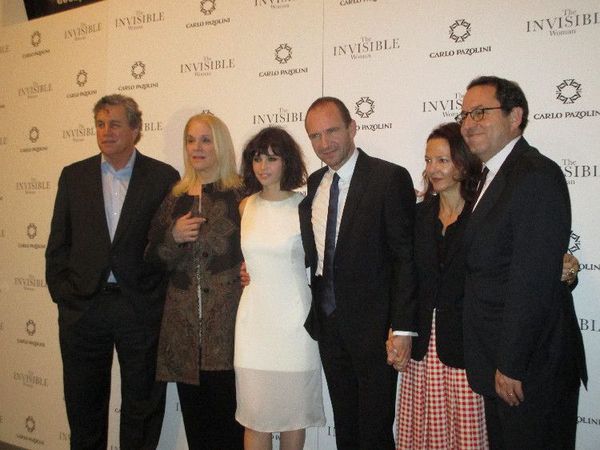 |
| Tom Bernard, Carolyn Marks Blackwood, Felicity Jones, Ralph Fiennes, Gabrielle Tana, Michael Barker Photo: Anne-Katrin Titze |
The Invisible Woman appeared last night at the Museum of Modern Art's Celeste Bartos Theater in New York City. Ralph Fiennes, director and star (as Charles Dickens) introduced the Sony Pictures Classics film and his co-star Felicity Jones who portrays Dickens' mistress Nelly Terman. Kristin Scott Thomas plays Frances Ternan, Nelly's mother, Joanna Scanlan is Dickens' wife. Tom Hollander, Perdita Weeks, Amanda Hale, Tom Burke, John Kavanagh and Michael Marcus round out the cast. Also on hand were The Invisible Woman's producers Carolyn Marks Blackwood and Gabrielle Tana, as well as Sony Pictures Classics co-founders Michael Barker and Tom Bernard. During the after party at Le Cirque presented by Carlo Pazolini, Julie Taymor gave me her take on another invisible woman, Giulietta Masina, in Feliini's Nights Of Cabiria.
Prior to the screening, I had a conversation with Felicity Jones on her unique new understanding of Dickens' work and the authenticity of undergarments.
Dickens was much admired in his lifetime. One of the most telling scenes about him in The Invisible Woman is one he is not in. His wife Catherine is forced to present a piece of jewelry that was mistakenly sent to her, to her husband's mistress Nelly on her birthday.
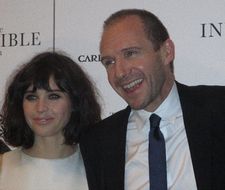 |
| Felicity Jones with Ralph Fiennes on Dickens: "I feel very close to him when I read his work." Photo: Anne-Katrin Titze |
Anne-Katrin Titze: How much did you know about Dickens before this project?
Felicity Jones: How much did I know about him? I mean, I knew his work. I've grown up reading his stories and going to see some plays of his work. I didn't know a lot about his life, his private life. I didn't realise there was such a difference between the public man and the private man. I learned so much reading Claire Tomalin's book which the screenplay is based on and researching who these people were. Actually, one of my favorite novels was Great Expectations, which since knowing so much about Nelly I feel like there's so much of their relationship in the novel which made it even more wonderful than it already was.
AKT: How is it now? Do you have a new appreciation for the work since the part of his mistress entered your life?
FJ: Oh absolutely. I feel very close to him when I read his work. It's very strange, because you feel like you understand someone on a rather deeper level, once you spent so much time trying to understand who they were.
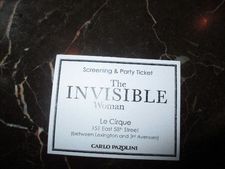 |
| The Invisible Woman invitation Photo: Anne-Katrin Titze |
AKT: In one of the strongest scenes, Catherine Dickens, his wife, visits you, Nelly, and hands you a gift of jewelry by her husband sent to her by mistake. Your faces speak volumes.
FJ: Joanna Scanlan is an incredible actress. She doesn't play the scene as a victim. She plays it with such honesty, almost a resignation and empathy for Nelly. That she is going to be in a similar situation as she was.
AKT: How much did the costumes help you discover Nelly physically? Once you put on the dresses, did it change your outlook?
FJ: It changes everything. It affects the way you move, the way you carry yourself. [Costume designer] Michael O'Connor is an absolute stickler for detail. Everything was exactly how it would have been. We'd have three petticoats which were extraordinarily heavy, over a cage with knickerbockers underneath.
AKT: Period underwear?
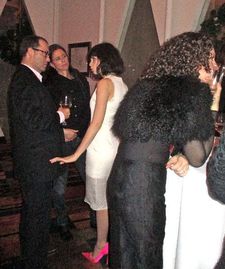 |
| Felicity Jones in pink shoes with Julie Taymor at Le Cirque Photo: Anne-Katrin Titze |
FJ: All period underwear. Everything. And then Michael was so happy when there's a shot where you might lift your skirt and you get to see one of the skirts underneath.
I also had some questions for Ralph Fiennes, whose answers led us from Shakespeare to Dickens to Slovenian Lacanian Slavoj Žižek, through paradoxes and contradictions until we landed around women's necks.
Anne-Katrin Titze: You go for the big guys. First Shakespeare [with Coriolanus, Fiennes' directorial debut] then Dickens.
Ralph Fiennes: It's not a strategy. This just came to me. The last thing in the world, if you had asked me after Coriolanus, will you make a film about Dickens, I'd have probably said absolutely not.
AKT: I was wondering, who the third author could be to fit into your trilogy.
RF: You are reading too much into it. The script came and I loved it. I didn't know anything about him [Dickens]. I didn't know about Nelly Ternan and then I read Claire Tomalin's book. That really got under my skin. Many, many things in it - Nelly Ternan, descriptions of Dickens, background to Nelly, her family being actresses, the theater, what it was to be an actress in 19th century theatre, the perception of actresses. Dickens himself is an amazingly contradictory man. There were many things about it.
AKT: What struck me was how Dickens comes across as a profoundly sad man behind the masks. You show us this sadness and yet it never pulls down the film - which is quite an extraordinary feat.
RF: Well, I think in this area of the film, he is a man who is unhappy in his marriage. He has got a persona that is very strong. Underneath, I think, he is lost. This young girl came into his life and for him she was something iconic. Of purity and innocence and something to do with starting again, maybe. The film for me is about the fragility of relationships and the fragility of intimacy. The way our closeness with people is so fragile. How we often don't understand our closeness, even when we're in it. And our memory of the closeness is something we don't understand and he seeks to have a comprehension of it.
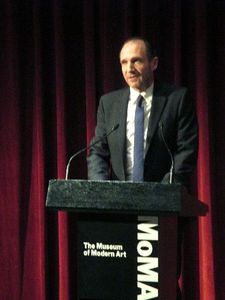 |
| Ralph Fiennes introducing The Invisible Woman at MoMA with a brief passage from Oliver Twist Photo: Anne-Katrin Titze |
AKT: What you are saying now makes me think of a point Slavoj Žižek makes. I didn't think of your sister's film [The Pervert's Guide To Ideology] in the context of Invisible Woman when I saw it but now I do. Žižek talks about [Bertolt Brecht's] "praise of the third thing". That relationships never really work one to one but that there has to be this "third thing" that stabilises the fragile construction into a triangle.
RF: Is that one of his things? I don't quite know how to respond to that. All I know is that in relationships one-on-one I find it profoundly mysterious, because we feel these things - attraction or desire. Or revulsion or resistance.
AKT: Which sometimes precisely is the object-cause-of-desire.
RF: It's very complicated. There are many paradoxes and contradictions. On one level, I think this in the story touched me in ways that I felt rather than I thought. On the surface it's the story about Dickens and Nelly and things that happened. For me, even with the children, Charley [Dickens], the son, the mother's love for the daughters and the decisions people make that seem odd.
AKT: You speak about Frances Ternan [played by Kristin Scott Thomas], Nelly's mother?
RF: Yes, how the mother acquiesces to brokering a silent agreement.
AKT: These are very strong scenes. We get a glimpse inside their heads. Your film also works wonders with women's necks.
RF: I love women's necks.
Sony Pictures Classics co-founder and chairman Michael Barker praised Fiennes that "his soul is infused in every frame and it is a privilege and pleasure to work with him" before the director introduced the screening of The Invisible Woman at MoMA. Fiennes returned the compliment and called Michael Barker, Tom Bernard and Sony Pictures Classics "the midwives for the film's launch in North America and the US." He thanked three "visible women" who were vital for the film: producers Carolyn Marks Blackwood and Gabrielle Tana (who also helped make Coriolanus and told me that she gave the script for the Invisible Woman to Fiennes) and his co-star Felicity Jones.
"If there's a technical glitch, I'll read the whole of Oliver Twist to you," Fiennes offered the audience, and admitted that he is still catching up with Dickens. He came across a brief passage in Oliver Twist that perfectly illustrates what Dickens described as "the spirit of contradiction," and read it to us. "Of such contradictions is human nature made up" ended the introduction by Fiennes, an elegant segue to the quote from A Tale of Two Cities that begins the film: "A wonderful fact to reflect upon, that every human creature is constituted to be that profound secret and mystery to every other."
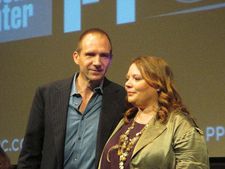 |
| Ralph Fiennes with Joanna Scanlan at the New York Film Festival Photo: Anne-Katrin Titze |
During the after party at Le Cirque, I had the chance to talk some more with Ralph Fiennes about how deeply this quote from A Tale Of Two Cities informs almost every scene of his movie. Following a discussion of another central driving force, the hunger for confession, we touched upon how the back of a person's head offers us the least opportunity to fake things.
I said hello to Julie Taymor, bringing up her compelling all black and white selection of movies that inspired her and which she presented with Antonio Monda as part of Le Conversazioni at New York's Morgan Library last month. A clip of Giulietta Masina's walk at the end of Federico Fellini's Nights Of Cabiria was a highlight of that evening. "How can you top that?" Taymor asked me. "You can't" we responded in unison about Masina's marvelous take on another invisible woman.
At the 51st New York Film Festival, Fiennes was honored with a Gala Tribute by the Film Society of Lincoln Center. During the press conference for The Invisible Woman, I spoke with him and his co-star Joanna Scanlan. The title might as well be plural, as Fiennes explores Dickens in his dealings with several women, including Scanlan's Catherine, the mother of his ten children.
Anne-Katrin Titze: When Catherine Dickens, his wife, is forced to come and present the piece of jewelry that was mistakenly sent to her, to her husband's mistress, is that scene mentioned in the biography? Is it something you added to the screenplay? Where did this telling episode come from?
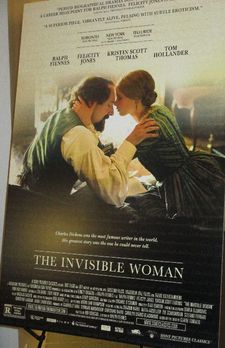 |
| The Invisible Woman US poster Photo: Anne-Katrin Titze |
Ralph Fiennes: It's mentioned in Claire Tomalin's book. It's meant to have happened. There is no proof but it's mentioned in biographies that he had a piece of jewelry made for Nelly [Ternan] that was then wrongly sent to Catherine Dickens. And he insisted that she give it back. I suppose in his head he is thinking, 'I've done nothing wrong. I'm not ashamed'. It was always a great scene. The proof of what a great scene it was was when I met Jo [Scanlan] and she very generously agreed to read. Within seconds, the scene that I had believed to be a good scene was, in her hands, a great scene. The way she brilliantly found the dignity in it. Of course, you know, we were married then.
Joanna Scanlan: There's something about when you love someone and someone else loves that same someone - a strange bond that is very powerful between you and that other woman. The fact of that moment when she returns the jewelry, [she could feel like his] doormat but at the same time she would have been curious, I imagine about this other woman and she wanted to be alone with her together which was quite tender, I think. Certainly with that act nobody knows what's going to happen. At that moment I felt great love and tenderness for Felicity.
The Invisible Woman opens in limited release on December 25 in the US and in the UK on February 7, 2014.





















